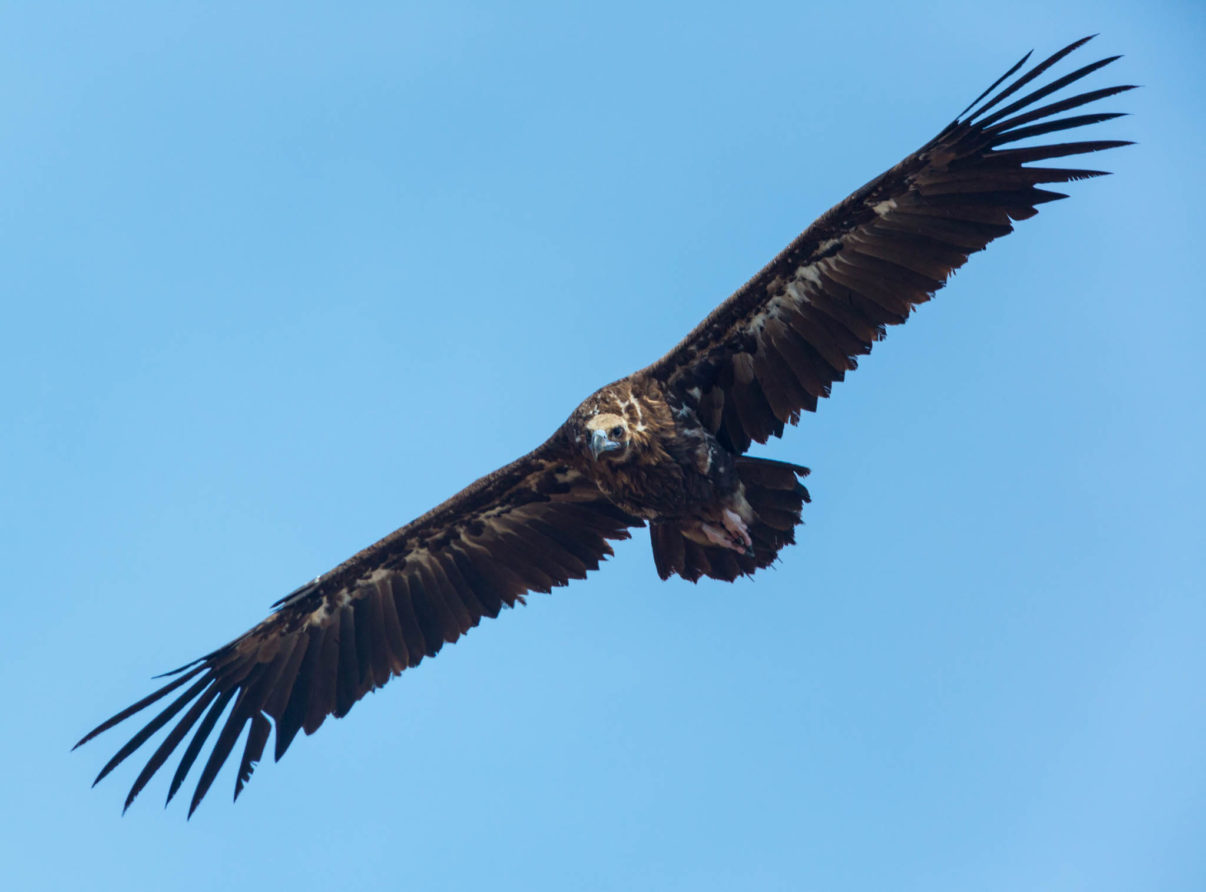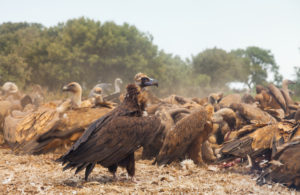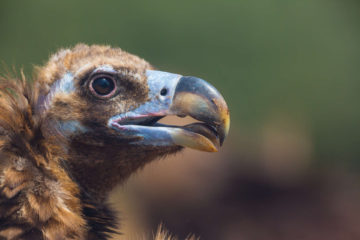The grant from cosmetics retailer Lush will be used to fund the first stage of a reintroduction programme, which aims to establish a breeding colony of the vultures in the Rhodope Mountains rewilding area on the Bulgarian-Greek border.

 First step
First step
A grant from UK-headquartered fresh cosmetics retailer Lush has seen the preliminary stage of a cinereous (black) vulture reintroduction programme begin in the Rhodope Mountains of southwest Bulgaria. The funding of 61,500 euros will support various preparatory actions, with the eventual aim of translocating and releasing vultures from Spain in the Rhodope Mountains rewilding area later in 2020.
Establishing a new breeding colony of cinereous vultures in Bulgaria will bolster the Balkan population of the bird. Cinereous vultures were once common across the region, but factors such as poisoning, a lack of food and collision with power lines mean they are now clinging on in Greece as a breeding species.
Working at landscape scale
The ultimate goal of the reintroduction programme is to have a healthy and naturally growing breeding population of cinereous vultures in the Bulgarian-Greek transboundary Rhodope Mountains, functioning as part of a diverse, self-sustaining ecosystem.
“Lush is unique in supporting a rewilding initiative working to recover an entire food chain at landscape scale, with the cinereous vulture as one of the top scavengers,” says Frans Schepers, Rewilding Europe’s Managing Director. “It is really encouraging to see large companies getting behind rewilding, and we are really grateful to Lush for their generous support.”
Restoring a population

Stoycho Stoychev is the team leader of the Rhodope Mountains rewilding team, which will carry out the preparatory work, together with local partner the Bulgarian Society for the Protection of Birds (BirdLife Bulgaria).
“The work we are now carrying out is the first step towards restoring a population comprising different cinerous vulture breeding colonies in the Rhodope Mountains,” he explains. “Such colonies will no longer rely on artificial feeding, but feed on natural prey, such as large herbivore carcasses and the remains of wolf kills.”
While cinereous and griffon vultures are currently supported by artificial feeding stations in the Bulgarian and Greek parts of the Rhodope Mountains, the Rewilding Rhodopes team has been working to increase the availability of natural prey for the birds in Bulgaria by restoring local populations of both red deer and fallow deer. Many local electricity pylons have also been isolated and diverters (coloured reflectors) fitted to power lines to prevent vultures from being electrocuted and colliding with the lines.
Multiple actions
Covering the first six months of 2020, the Lush grant will be used to fund diverse preparatory work for the reintroduction programme. This includes putting together a detailed reintroduction plan, obtaining relevant permits, formalising key partnerships, selecting and preparing the release site, and constructing the pre-release aviary where the translocated birds will acclimatise prior to their release.
The aim is to release around 10 birds a year for five years, starting in the latter part of 2020, or in early 2021. The translocated cinereous vultures will be sourced from Spain, where the vast majority of the European breeding population is currently located.
Spanish vulture breeding experts will visit the Rhodope Mountains rewilding area this year to offer advice, while the reintroduction team will also consult NGOs Green Balkans and the Vulture Conservation Foundation (VCF), who are currently overseeing a cinereous vulture reintroduction programme in Bulgaria’s eastern Balkan Mountains.
Precarious existence

The cinereous vulture is the largest of the four vulture species (cinereous, bearded, Egyptian, griffon) that occur in Europe. As with the other vulture species, factors such as habitat loss, the declining availability of carcasses, poisoning and collisions with power lines all took their toll on European populations during the twentieth century.
Today there are around 2,000 breeding pairs distributed across four countries – Spain, Portugal, France and Greece. Located in the Greek section of the Rhodope Mountains, the Dadia-Lefkimi-Soufli Forest National Park is the last stronghold of the cinereous vulture in the Balkans, with around 30-35 pairs breeding annually.
This number has remained relatively stable over recent decades, but the colony has failed to grow (most likely due to a relatively high mortality of fledglings). The concentration of birds in just one colony increases the risk of localised extinction.
Cinereous vultures have long been extinct as a breeding species in Bulgaria, but birds from across the border in Greece frequently visit the Rhodope Mountains rewilding area in search of food. As part of the LIFE Vultures project, artificial nests have been constructed by the Rewilding Rhodopes team to encourage the birds to breed, but factors such as their high mortality rate have so far rendered these efforts unsuccessful, hence the need for the reintroduction programme.
Funding rewilding
 The grant from Lush was provided through the retailer’s Re:Fund, which it uses to support regenerative action across the world. Through the fund, grants are made to projects in three different areas: disaster and displacement, permaculture and agroecology, and rewilding and biodiversity.
The grant from Lush was provided through the retailer’s Re:Fund, which it uses to support regenerative action across the world. Through the fund, grants are made to projects in three different areas: disaster and displacement, permaculture and agroecology, and rewilding and biodiversity.
“We were thrilled to award this grant to Rewilding Europe and the vulture reintroduction programme in the Bulgarian Rhodopes,” says Lívia Fróes, who oversees the rewilding and biodiversity side of the Re:Fund as a member of Lush’s Ethical Buying department. “The initiative’s expertise and commitment to hands-on, practical rewilding really impressed us. We wish the reintroduction team every success in the year ahead.”
Additional funding for the preparatory work has been provided by Arcadia, the UK-based charitable fund of philanthropists Lisbet Rausing and Peter Baldwin. Rewilding Europe will seek further funding for the translocation and release stage of the programme.
A key species
Natural-born gliders, vultures never fail to provide an aerial spectacle. Beyond their ability to inspire awe, however, they also play a critical role in maintaining the structure and functioning of natural ecosystems as scavengers. This is why they are known as “keystone species“.
Rewilding Europe supports the comeback of vultures in many of its rewilding areas, as well as through promotion of the so-called “Circle of Life“.
Want to know more?
- Rewilding Rhodopes website
- LIFE Vultures project
- Rhodope Mountains rewilding area
- Experience Bulgaria’s Rhodope Mountains with the European Safari Company
- More about Lush
